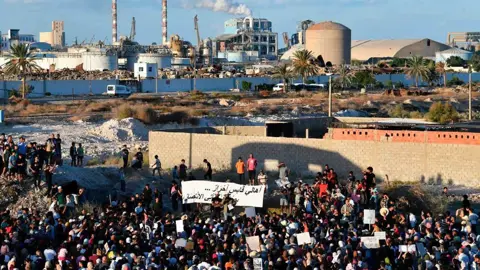Protests Erupt in Gabès Amid Health Crisis Linked to Industrial Pollution

Gabès, located in southeastern Tunisia, is experiencing heightened tensions as recent weeks have seen a surge in cases of suffocation and paralysis among residents, which are being linked to a local chemical facility.
Hundreds of demonstrators gathered outside the courthouse in Gabès to support a lawsuit demanding the closure of polluting industrial units. They chanted slogans calling for an end to the "environmental disaster" and the dismantling of the phosphate processing plant, which has long been accused of causing serious health issues and environmental degradation in the area.
During a court session dedicated to reviewing the cessation of the plant's activities, attorney Monir Adouni, representing the plaintiffs, stated that he presented evidence to the court indicating a "crime against the city." The court is set to continue its examination of the case on November 20.
This unrest follows the release of video footage showing students being transported in critical condition after suffering from suffocation incidents at their schools. Local authorities reported 22 new cases of suffocation at Chott Essalem School and three more at another institution, accompanied by symptoms such as difficulty walking, numbness, and partial paralysis, sparking public outrage.
Residents describe the operations of the plant, which has been in operation since 1972, as an "ongoing environmental crime" that has led to increased cancer rates and respiratory issues. Environmental reports indicate harmful gas emissions and the disposal of phosphogypsum waste, which is contaminated with heavy metals, into the sea.
In response to rising public pressure, the Minister of Environment announced a plan to clean up 9,000 hectares of seabed in the Gabès Bay, while the Minister of Equipment promised "urgent and extraordinary" measures to reduce pollution. President Kais Saïed has tasked a special team with finding immediate solutions to the crisis.
Despite these efforts, the situation remains complex due to the significant economic importance of the phosphate sector in Tunisia, where the government aims to increase fertilizer production to 13 million tons per year by 2030. This raises questions about balancing economic demands with the community's right to a healthy environment.
